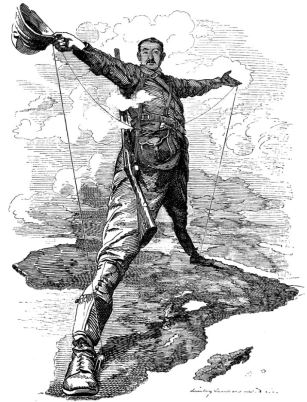New Ambassador for a Company Built on Genocide, Blood Diamonds Shows Limits of Representation Again

On October 24, the infamous diamond company De Beers officially announced its first-ever brand ambassador, Lupita Nyong’o. Like when Beyonce donned the Yellow Tiffany Diamond, this prompted a mixed-negative reaction because (like the Yellow Tiffany) the company is deeply steeped in colonial history and the slicing up of Africa for exploitation. While De Beer’s commenters on Instagram were largely positive because luxury aesthetics, regardless of harm, has an undying grip on society, Nyong’o’s commenters were understandably very shocked and upset.
Nyong’o wrote in praise of the company, and part of her captions reads, “Even more importantly, my partnership with De Beers allows me to extend my advocacy for women and girls around the world.” One of De Beers’ goals in this campaign is to bring 10,000 young girls to STEM programs and support 10,000 women entrepreneurs. Even if we pretend from now forward De Beers has completely corrected exploration in all parts of the supply chain, the campaign promises a measly 10 million dollars spread out over seven years. That’s the equivalent of less than .2% of De Beers’ annual revenue in 2021 alone (5.6 billion) and during a global recession.
While the company holds less than a third of the diamond market today (down from 90%), it’s on track to bounce back from a 2020 low due to its main competitor (based in Russia) being limited by sanctions. In Adam Conover’s first episode of Adam Ruins Everything (back when it was a part of College Humor) in which he aptly called “De Beers a diamond cartel,” Conover briefly explained how De Beers advertising convinced people diamonds are an essential part of the engagement tradition. While he and others have referenced the cartel in a business way by means of violence and monopolies, it goes much further than this.
De Beers

Most of De Beers’ exploits have been talked about in terms of South Africa (which is quite understandably given the extent), but they also extend into Zimbabwe, Zambia, and Botswana. Led by Cecil Rhodes and with significant leadership under the Oppenheimer family, De Beers and their many subsidiaries displaced, killed, incarcerated, and worked million of Afrikaners (Black South Africans) and migrants. They justified this through a belief in white supremacy and by infantilizing Afrikaners from the 1800s forward.
When De Beers wasn’t working native Black Afrikans to death, and Rhodes wasn’t busy in the colony’s parliament (as Prime Minister for nine years) to limit Black people’s freedom, the company also made weapons for “The White Man’s War” in the region. Second, only to H.F. Verwoerd, Rhodes is considered a major architect of apartheid in South Africa. Like many men in history, Rhodes’ legacy has been reframed through philanthropic measures. One such legacy is Rhodes University in South Africa (which didn’t accept Black students until decades after his death) and the Rhodes Scholar program at Oxford.
For years, activists have tried to remove statues of people like Rhodes from across South Africa and the U.K. and bring to light recent controversies. The company acknowledges its recent, bloodthirsty past (which includes recent genocides and participation in the blood diamond economy), but stops short of any massive fix. That is, unless you count this recent choice to put a high-profile Black woman on a campaign, greenwash your environmental concerns, and promote equality in a ravenous industry (with pennies, too).
Dissonance
When the first murmuring of a The Woman King boycott emerged online, many people pointed to Nyong’o’s exit from the project as proof of an agenda to soften (more than any other historical fiction movie) the legacy of the Dahomey Kingdom. After the project was announced, Nyono’o participated in the painful documentary Warrior Women with Lupita Nyong’o by traveling to Benin. Sometime after she exited the project (alongside The Lady in the Lake), but that was enough evidence for many.
People are complicated and full of contradictions, but I find it hard to believe Nyong’o found there could be no ethical way to tell a story about Dahomey, but feels that De Beers has anyone’s best interest involved (except shareholders). Least of all Black people and “women and girls around the world.” As a Kenyan-Mexican whose family fled from violence funded by colonial proxy interests, Nyong’o knows that the violence that occurs in these spaces of exploration is hidden behind good PR and national interest, so it’s disappointing to see her cash this check.
(via Twitter, featured image: Jesse Grant / Stringer / Getty Images)
—The Mary Sue has a strict comment policy that forbids, but is not limited to, personal insults toward anyone, hate speech, and trolling.—
Have a tip we should know? [email protected]
